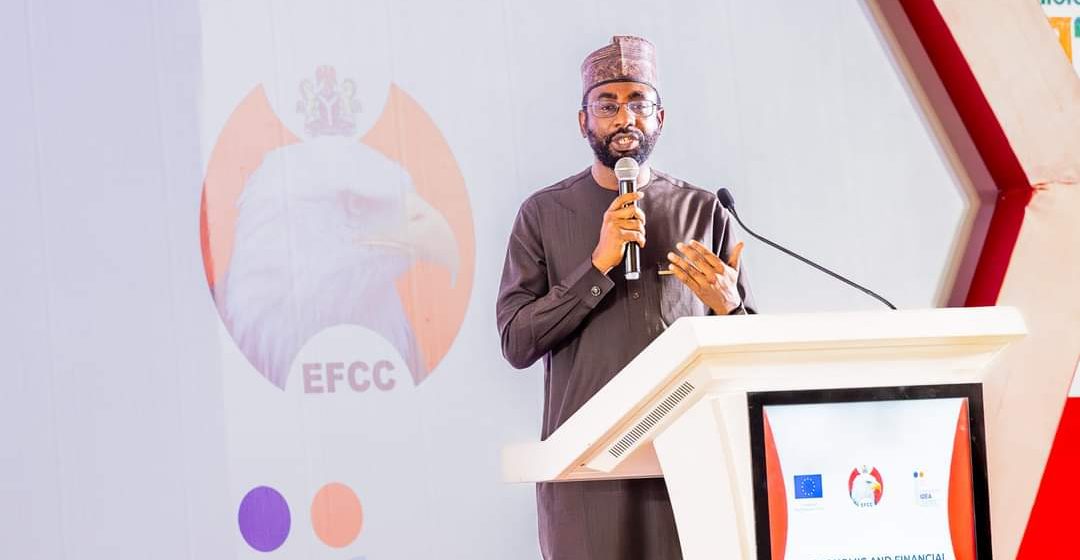The Director General of the National Information Technology Development Agency (NITDA), Kashifu Inuwa CCIE, has called on the public and private sectors to increase their investments in cybersecurity professional training as part of the transformative journey to strengthen national security with a complete commitment to robust cybersecurity measures and digital trust. He cites the fact that the advantages of securing organizations and processes far outweigh the cyber-attacks.
At the National Cybercrimes Summit 2024, which was hosted by the Economic and Financial Crimes Commission in the Banquet Hall of the Presidential Villa, the DG made this appeal as a Guest Speaker while delivering a paper titled “Alternative to Cybercrime.”
With the theme “An alternative to cybercrime: Optimising Cyber Skills for National Development,” the summit served as a forum for industry captains, security agency chiefs, and traditional and religious leaders to exchange ideas, knowledge, and experiences with an emphasis on improving digital skills as a means of thwarting cybercrime.
While suggesting alternate career paths for Nigeria’s youth and tactics to strengthen national cyber resilience, Inuwa emphasized the pressing need to address the growing threat of cybercrime in Nigeria.
He explained the intricacies of cybercrime, pointing out that as technology becomes more interconnected, it no longer only affects laptops and desktop computers but also mobile devices, smart TVs, automobiles, and more.
According to research, there are five main types of cybercrime: attacks on technical products or services, extortion attacks, data or identity theft, scams, cashing out, and money laundering. Inuwa also said that the financial sector is still the most vulnerable in Africa, with over 3,300 cyberattacks reported every week.
In addition to emphasizing that cybercrime is a worldwide problem that impacts all aspects of the digital economy, especially in Nigeria, he stated, “We are confronted with an urgent reality, Nigeria, a nation with rich culture, talent, and limitless potential is unfortunately grappling with the global menace of cybercrime but today, we are going to look at alternatives to cybercrime,
Inuwa listed the fundamental causes of cybercrimes, including financial incentives, unemployment, and ignorance of the ethical and legal ramifications. She advocated for a more comprehensive strategy to combat cybercrime, one that includes both law enforcement and providing workable alternatives to individuals who are tempted by illicit online activity.
“To divert young Nigerians from cybercrime, we must consider alternatives to cybercrime and the government must prioritize digital literacy, skill development, and job creation,” he claimed.
Inuwa emphasized the potential of the digital economy to generate millions of jobs and make a substantial contribution to Nigeria’s GDP, while reiterating the significance of offering constructive alternatives to young Nigerians.
Senator Oluremi Tinubu, the first lady of the Federal Republic of Nigeria, unveiled and opened the EFCC Rapid Response Center, a 24/7 cybercrime response desk, which was the event’s high point.
The Nigeria Governor’s Forum Chairman, AbdulRahman AbdulRazaq, the governor of Kwara State, Katsina State, Dikko Umar Radda, Zamfara State, Dauda Lawal, Sultan of Sokoto, Alhaji Muhammadu Sa’ad Abubakar, Obi of Onitsha, Igwe Alfred Nnaemeka Achebe, the Ooni of Ile Ife, who was represented by the Alara of Ilara, Oba Olufolarin Olukayode Ogunsanwo, the president of the Christian Association of Nigeria, Dr. Daniel Okoh, and numerous other dignitaries were at the event.



Leave a Reply